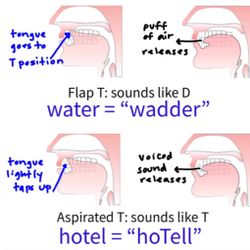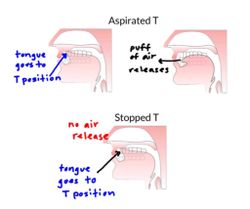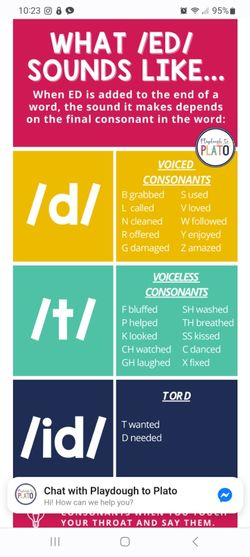Feb 3, 2023
T Sh CH sounds

In American English, we have 3 different ways of making a "T" sound. For all of the /t/ sounds, we use the tip of the tongue and the alveolar ridge (the roof of the mouth just behind the teeth). In the start of words, we always use an aspirated t. This means we have a puff of air which escapes when we release the t.

In the middle of words, we use aspirated T, stopped T, and flapped T. A Flap T is different because the voice is on (unlike the other types of T, which are voiceless), and a flap T does not have any build-up of air like a T or a D. The tongue contacts the alveolar ridge lightly and releases immediately. If you have difficulty with flap T, it can help to think of it as a light D sound.
Medial T is usually flapped when between 2 vowel sounds. This includes final T when the next word begins with a vowel and we link words. (Final T Linking is discussed here.)
Most words with -ter, -ted, -test, -ting, -ty
better, batter, butter, letter, waiter, writer, water, litter, greater, lighter, wetter
waited, righted, lighted, matted, sighted, fitted,
metabolic, artificial, comforting, dirty, city
greatest, hottest, fatal, hospital, turtle
Medial T (stopped when followed by syllabic n or -ment, -ance, -ly, -m)
Button kitten mittens rotten cotton mountain threaten
Appointment, department, commitment, disappointment, adjustment, treatment
Important, Importance, combatant, pollutant,
Ultimately, infinitely,
Atmosphere
Medial T between 2 vowels (aspirated when second syllable is stressed, other exceptions)
Guitar potato eighteen hotel motel retirement material
Architecture laboratory irritant militant
Medial T (aspirated when not any of the above: in a cluster, not between two vowels)
Distant, Opportunity, transportation, Intonation, enter, interpretation, reputation, representation, concentrate, multi-, sophisticated, documentation, investigate, particular, metro-, consultation, continuation, anticipation
Medial nt words, can sometimes omit t: wanted, Santa Barbara, counter, anti- (eg antibiotic) inter-(eg international), representative, identification, disappointing, advantage
let's read the following sentence aloud: The chef added cherries to the Christmas pudding.
Did you notice that all 3 words beginning in Ch makes a different sound?
When two letters represent one sound, the combination of letters is called a digraph. The digraph “ch” makes three different sounds in English.
This can be confusing for language learners since there are no spelling or pronunciation rules to follow. The origin of these words, however, can be a guide.
CH = /TCH/
The digraph “ch” is most commonly pronounced as /tch/ (written as /tʃ/ in the International Phonectic Alphabet, or IPA). Most of the words with this sound come from Old English and are Germanic in origin. Examples include child, church, and each.
Some words of French origin, like challenge and chance, also use the /tch/ sound. This is because in Old French, words with “ch” were pronounced /tch/.
In words of Greek origin, “ch” is usually pronounced as /k/. The word character, for example, comes from the classical Greek kharaktēr (meaning “engraved mark”).
More examples of words with the /k/ sound are anchor, chaos, echo, mechanic, orchestra, psychology, school, and stomach.
CH = /SH/
In words of French origin, “ch” can be pronounced as /tch/ or /sh/ (IPA: /tʃ/ or /ʃ/).
The city name "Chicago," for example, is thought to have come from the French-Canadian form of the Miami-Illinois word “shikaakwa,” or “smelly onion.” Algonquin people are known to have named natural landmarks after plants that grew in the surrounding area.
Other examples of words from French with the /sh/ sound include brochure, champagne, chef, fuchsia, machine, mustache, parachute, and quiche.
SH sound
Spelling:
“sh” – shoe, push
“ss” (+ “u” or “I”) – pressure, mission
“ch” – champagne, machine
“ti” – patience, station
“ce” (not common)– ocean, groceries
“s” (not common) – sugar, sure
The sound /ʃ/ is present in the suffixes "–tion" and "-ssion". These suffixes may turn a verb into a noun if the verb ends in /t/ or /s/.
create --> creation
direct --> direction
educate --> education
express --> expression
discuss --> discussion
1. shape
2. shine
3. shell
4. shabby
5. shrimp
6. shrewd
7. brush
8. cash
9. fish
10. harsh
11. rushed
12. publish
13. foolish
14. ocean
15. machine
16. portion
17. mention
18. addiction
19. assumption
20. sensation
1. technicians – rushed - machine
The technicians rushed to repair the machine.
2. she – groceries* – cash
She paid for the groceries with cash.
3. essential – share – information
It’s essential that we share this information with the public
4. invitation – mention – location
The invitation didn’t mention the location of the party.
5. chef – selection – dishes
The chef prepared a selection of dishes for us to try.
6. wash – shampoo – conditioner
I always wash my hair with shampoo and conditioner

By undefined
16 notes ・ 29 views
English
Upper Intermediate